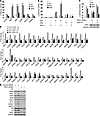Submit a comment
Citation Information: J Clin Invest. 2012;122(8):2857-2870. https://doi.org/10.1172/JCI62676.
Abstract
The initiation of breast cancer is associated with increased expression of tumor-promoting estrogen receptor α (ERα) protein and decreased expression of tumor-suppressive ERβ protein. However, the mechanism underlying this process is unknown. Here we show that PES1 (also known as Pescadillo), an estrogen-inducible protein that is overexpressed in breast cancer, can regulate the balance between ERα and ERβ. We found that PES1 modulated many estrogen-responsive genes by enhancing the transcriptional activity of ERα while inhibiting transcriptional activity of ERβ. Consistent with this regulation of ERα and ERβ transcriptional activity, PES1 increased the stability of the ERα protein and decreased that of ERβ through the ubiquitin-proteasome pathway, mediated by the carboxyl terminus of Hsc70-interacting protein (CHIP). Moreover, PES1 transformed normal human mammary epithelial cells and was required for estrogen-induced breast tumor growth in nude mice. Further analysis of clinical samples showed that expression of PES1 correlated positively with ERα expression and negatively with ERβ expression and predicted good clinical outcome in breast cancer. Our data demonstrate that PES1 contributes to breast tumor growth through regulating the balance between ERα and ERβ and may be a better target for the development of drugs that selectively regulate ERα and ERβ activities.
Authors
Long Cheng, Jieping Li, Yongjian Han, Jing Lin, Chang Niu, Zhichao Zhou, Bin Yuan, Ke Huang, Jiezhi Li, Kai Jiang, Hao Zhang, Lihua Ding, Xiaojie Xu, Qinong Ye
Guidelines
The Editorial Board will only consider comments that are deemed relevant and of interest to readers. The Journal will not post data that have not been subjected to peer review; or a comment that is essentially a reiteration of another comment.
- Comments appear on the Journal’s website and are linked from the original article’s web page.
- Authors are notified by email if their comments are posted.
- The Journal reserves the right to edit comments for length and clarity.
- No appeals will be considered.
- Comments are not indexed in PubMed.
Specific requirements
- Maximum length, 400 words
- Entered as plain text or HTML
- Author’s name and email address, to be posted with the comment
- Declaration of all potential conflicts of interest (even if these are not ultimately posted); see the Journal’s conflict-of-interest policy
- Comments may not include figures



Copyright © 2025 American Society for Clinical Investigation
ISSN: 0021-9738 (print), 1558-8238 (online)

